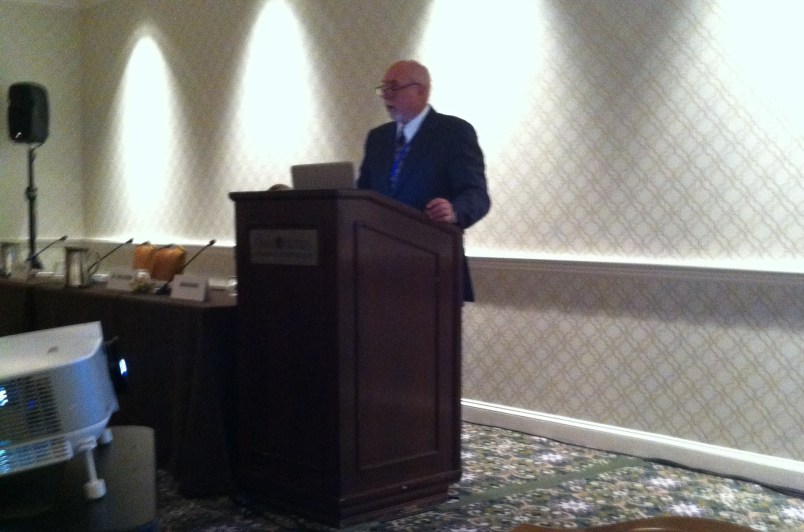At a panel on the future of marriage in the United States, Frank Schubert, who has served as the National Organization for Marriage’s political director, aimed to unskew polls showing broad support for same-sex marriage in the country.
Schubert, during the panel at the Values Voter Summit on Saturday, first cited polling from 2012 from The Polling Company and Public Opinion Strategies showing support for continuing to define marriage as just between one man and one woman.
“You hear in the media that everybody’s moving to support same-sex marriage. [That] it’s just a tidal wave. This is not the case,” Schubert (pictured) said.
The panel, “The Future of Marriage: To the Supreme Court and Beyond,” aimed to address recent court decisions overturning bans on same-sex marriage. The Supreme Court will return from a break on Monday. The justices will decide if they will hear any of a number of same-sex marriage cases over the next term.
Schubert went on to say that the pollsters like Gallup that have shown broad support for same-sex marriage didn’t accurately the public feeling for same-sex marriage. A May Gallup poll found that public support for laws recognizing same-sex marriage had jumped to 55 percent.
But Schubert said those polls were not accurately surveying their samples and also incorporated leading questions that swayed participants’ responses.
“If you only ask adults, 18+ you’re going to get the highest number of anyone asked. If you’re going to get actual voters you’re going to get least support. Second factor is question wording,” Schubert said. “There’s a phenomenon in polling that’s called favorable response bias. What does that mean? It means people want to give you a favorable answer. They want to say ‘yes.’ They want to say yes, I agree, I am for it.”
Schubert national polls that showed majority support for same-sex marriage had fallen prey to the favorable response bias.
“When you give the favorable response to decide traditional marriage, guess what? The numbers reverse,” Schubert said.
The third factor was that polls that showed majority for support for same-sex marriage had those findings because of “priming” where a series of questions leading up to a big question (like gay marriage) swayed the voter to say they supported same-sex marriage.
That’s all part of a strategy of the other side to mislead the public to think there’s broad support for legalizing same-sex marriage, Schubert said. The tell, Schubert continued, is that advocates of gay marriage lean more on judges ruling that gay marriage bans are unconstitutional and less on individual states’ votes on same-sex marriage.
“If in fact the other side believed their rhetoric —that the game is changed, that people are now on their side, history is now at their door, don’t you think that they would press votes to happen now?” Schubert.
Schubert dismissed rulings defining marriage as something other than between one man and one woman.
“A judge declaring that marriage is not between a man and a woman is illegitimate because that’s what it is, “Schubert said.
During the panel, Brian Brown, the president of the National Organization of Marriage, said the arguments made on the panel are rare because of the media.
“A lot of what you’ve heard to do you definitely are not hearing from the media,” Brown said. “As I said in the beginning, the presentation is always that somehow this battle has been lost, why doesn’t NOM just packup ship and go home —which we’ll never do.”
Brown also said that his organization would work to defeat Republicans who support same-sex marriage. He cited Sen. Rob Portman (R-OH), who announced his support for gay marriage in 2013, and Congressional candidate Carl DeMaio, who is gay.
“We are going to work to defeat Republicans who oppose us on gay marriage,” Brown said.







R-I-I-IGHT… Because “unskewing” has worked SO well in the past… NOT… Can they get any more delusional?
The irrelevant defending the indefensible.
We all know what a success rate NOM has. ~snicker~
You are free to be, and remain, a bigot. You may speak openly about your bigotry, both in public and in private. You may NOT, however, force your bigotry upon others. That’s what the Constitution says, and the courts are going about making sure the Constitution, not your bigotry, is the law of the land. Unskew all you wish, but when you’re all done it’s still just math you tell yourself…and Ohio still voted for the President.
Ignorance within the right wing bubble must be bliss to these people.
I’m sure the unskewing will go just as well as it went for President Romney.
Oh yeah. Never mind. Please proceed.